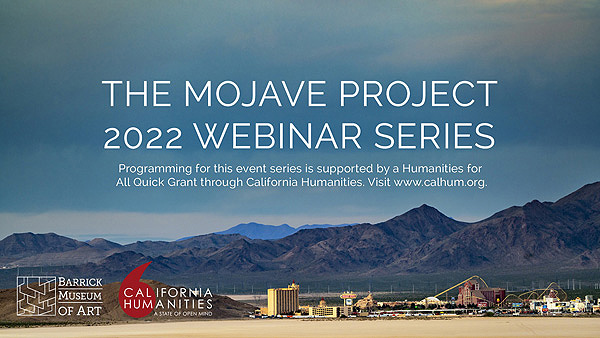
The Mojave Desert is undergoing profound physical transformation due to human activity. The Mojave Project illuminates how human activities affect wildlife habitat, ecosystems, and our quality of life throughout this arid bioregion. Understanding what is at stake is crucial to transition to a sustainable future for all living organisms. To do so, we must delve into the history of regional land use, including that of the Mojave’s Indigenous Peoples and others previously underrepresented.
Our four scheduled webinars coinciding with The Mojave Project exhibition at the Marjorie Barrick Museum of Art at the University of Nevada, Las Vegas (UNLV), bring together a variety of voices and perspectives, including Indigenous culture bearers, scholars, researchers, artists and activists from the Mojave Desert bioregion spanning California, Nevada, Arizona and Utah. This free-to-the-public webinar series educates our audience by generating impactful conversation. Please join us by registering below. Note that you will need to register for each webinar program separately.
Our program is supported by a Humanities for All Quick Grant through California Humanities. with the Marjorie Barrick Museum of Art at the University of Nevada, Las Vegas, acting as our programming host.
Each panel discussion focuses on a Mojave Project theme to prompt dialog and conversation. Each session will be recorded and made available for public viewing at the Barrick Museum of Art’s YouTube channel at a later date.
The Legacy of the Nevada Test Site
April 7, 2022, 7 – 8:30 pm
Our first panel discussion, centered on the Sacrifice and Exploitation theme, will explore the history of atomic weapons testing at the Nevada Test Site (NTS), its long-term environmental impacts on the desert ecosystem including the legacy atomic testing has had on the Downwinder population. The discussion will place particular emphasis on the Western Shoshone’s continued struggle to protect ancestral lands illegally seized by the federal government for the siting of the NTS during the mid-twentieth century. This panel will be held as a Zoom webinar hosted by UNLV on Thursday, April 7, 2022, from 7 – 8:30 pm. CLICK HERE to register for this free online event.
Panel participants include:
- Dr. Andy Kirk, Professor and Chair, UNLV Department of History, project lead of the Nevada Test Site Oral History Project
- Dr. Valerie Kuletz, author of The Tainted Desert: Environment and Social Ruin in the American West, Routledge, 1998
- Kim Stringfellow, Mojave Project director, will act as panel moderator
Big Desert Solar & Wind—But at What Cost?
May 19, 2022, 7 – 8:30 pm
Our second Sacrifice and Exploitation panel discussion features an artist and a writer, both activists, responding to the onslaught of industrial-scale renewable energy projects currently active or slated for construction in previously undeveloped desert habitats of eastern California and southern Nevada’s Mojave Desert bioregion. This panel will be held as a Zoom webinar hosted by UNLV on Thursday, May 19, 2022, from 7 – 8:30 pm. CLICK HERE to register for this free online event.
Panel participants include:
- Kim Garrison Means, artist, educator and director of the Mystery Ranch artist residency, Searchlight, NV
- Shannon Salter, UNLV Graduate Assistant, English Department, Basin and Range Watch board member
- Kim Stringfellow, Mojave Project director, will act as panel moderator
Indigenous Perspectives of the Mojave Desert
June 23, 2022, 7 – 8:45 pm
The highlight of our programming series is the Indigenous Perspectives of the Mojave Desert panel discussion which includes representatives from four Native American tribal groups whose current and traditional homelands are located within the Mojave Desert. This conversation will dispel and dismantle the outdated but persistent mindset that the desert is a wasteland by sharing cultural traditions, philosophies, and personal stories that convey their deep regard and sacred connection to the lands they inhabit. Our goal is to amplify the contemporary experience of the Mojave Desert’s Indigenous people within their shared cultural landscape. Programming co-sponsors include the Native American Land Conservancy, Mojave Desert Land Trust and The Cultural Conservancy. Programming co-sponsors of this program include the Native American Land Conservancy, Mojave Desert Land Trust and The Cultural Conservancy. This panel will be held as a Zoom webinar hosted by UNLV on Thursday, June 23, 2022, from 7 – 8:45 pm. CLICK HERE to register for this free online event.
Panel participants include:
- Matthew Leivas, Sr., Salt Song singer, Chemehuevi Indian Tribe, CA
- Ashley Hemmers, Fort Mojave Indian Tribe, CA/AZ/NV
- Barbara Durham, Tribal Elder, Timbisha Shoshone, CA
- Melissa Nelson, President Emerita, The Cultural Conservancy
- Phillip Klasky, Lecturer at the Department of American Indian Studies, San Francisco State and Mojave Project contributor
- Michael Madrigal, Cahuilla Band of Mission Indians, CA, Board President of the NALC will act as panel moderator.
African American Homesteading in Lanfair Valley
July 14, 2022, 7 – 8:30 pm
During the early twentieth century, twenty-three African American families filed for homesteads in the eastern Mojave at Lanfair Valley near Goffs, California. Palm Springs-based artist Barbara Gothard has been conducting extensive research on these homesteaders which has led to a body of artwork on display at the San Bernardino County Museum from February 8 – April 20, 2022. For this Transformation and Reinvention panel discussion, Gothard will be in conversation with Claytee White, who directs the Oral History Research Center at UNLV Libraries. As one of the five founders of the Las Vegas Black Historical Society Inc., White chronicles the history of the Las Vegas black community that was established in 1905. This panel will be held as a Zoom webinar hosted by UNLV on Thursday, July 14, 2022, from 7 – 8:30 pm. CLICK HERE to register for this free online event.
- Barbara Gothard, visual artist and researcher
- Claytee D. White, Director of the Oral History Research Center at UNLV Libraries
- Kim Stringfellow, Mojave Project director, will act as panel moderator
Programming is made possible with support from California Humanities, a non-profit partner of the National Endowment for the Humanities. Visit www.calhum.org.

